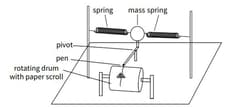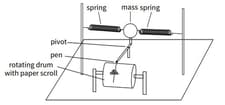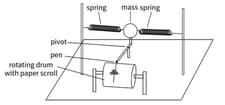David Sang and Graham Jones Solutions for Chapter: Oscillations, Exercise 15: EXAM-STYLE QUESTIONS
David Sang Physics Solutions for Exercise - David Sang and Graham Jones Solutions for Chapter: Oscillations, Exercise 15: EXAM-STYLE QUESTIONS
Attempt the practice questions on Chapter 18: Oscillations, Exercise 15: EXAM-STYLE QUESTIONS with hints and solutions to strengthen your understanding. Physics for Cambridge International AS & A Level Coursebook 3rd Edition Digital Access solutions are prepared by Experienced Embibe Experts.
Questions from David Sang and Graham Jones Solutions for Chapter: Oscillations, Exercise 15: EXAM-STYLE QUESTIONS with Hints & Solutions
A mass, hung from a spring, oscillates with simple harmonic motion. Which statement is correct?
The bob of a simple pendulum has a mass of . The pendulum oscillates with a period of and an amplitude of .At one point in its cycle it has a potential energy of .What is the kinetic energy of the pendulum bob at this point?
When a cricket ball hits a cricket bat at high speed it can cause a standing wave to form on the bat. In one such example, the handle of the bat moved with a frequency of 60Hz with an amplitude of 2.8mm. The vibrational movement of the bat handle can be modelled on simple harmonic motion. Calculate the maximum acceleration of the bat handle.
When a cricket ball hits a cricket bat at high speed it can cause a standing wave to form on the bat. In one such example, the handle of the bat moved with a frequency of 60Hz with an amplitude of 2.8mm. The vibrational movement of the bat handle can be modelled on simple harmonic motion. Given that the part of the bat handle held by the cricketer has a mass of , calculate the maximum force produced on his hands.
When a cricket ball hits a cricket bat at high speed it can cause a standing wave to form on the bat. In one such example, the handle of the bat moved with a frequency of 60Hz with an amplitude of 2.8mm. The vibrational movement of the bat handle can be modelled on simple harmonic motion. The oscillations are damped and die away after about five complete cycles. Sketch a displacement- time graph to show the oscillations.
Seismometers are used to detect and measure the shock waves that travel through the Earth due to earthquakes.
This diagram shows the structure of a simple seismometer. The shock wave will cause the mass to vibrate, causing a trace to be drawn on the paper scroll.
The frequency of a typical shock wave is between and . Explain why the natural frequency of the spring- mass system in the seismometer should be very much less than this range of frequencies. This graph shows the acceleration of the mass against its displacement when the seismometer is recording an earthquake.
Seismometers are used to detect and measure the shock waves that travel through the Earth due to earthquakes. This diagram shows the structure of a simple seismometer. The shock wave will cause the mass to vibrate, causing a trace to be drawn on the paper scroll.
The graph in figure shows the acceleration of the mass against its displacement when the seismometer is recording an earthquake.
What evidence does the graph give that the motion is simply harmonic ?
Seismometers are used to detect and measure the shock waves that travel through the Earth due to earthquakes.
This diagram shows the structure of a simple seismometer. The shock wave will cause the mass to vibrate, causing a trace to be drawn on the paper scroll.
The graph in figure shows the acceleration of the mass against its displacement when the seismometer is recording an earthquake.
Use information from the graph to calculate the frequency of the oscillation.






